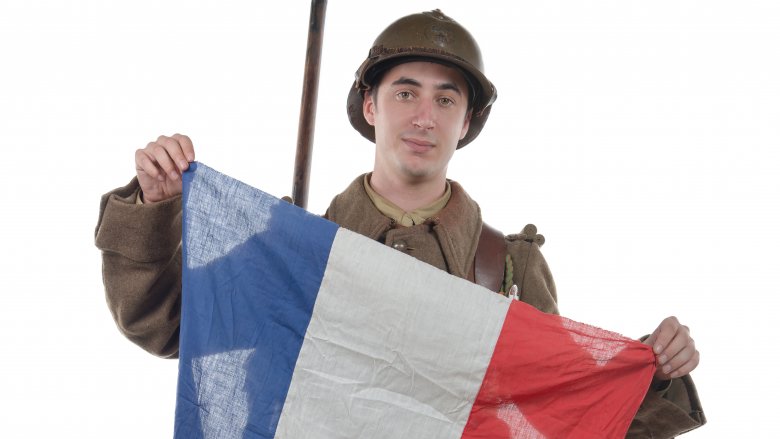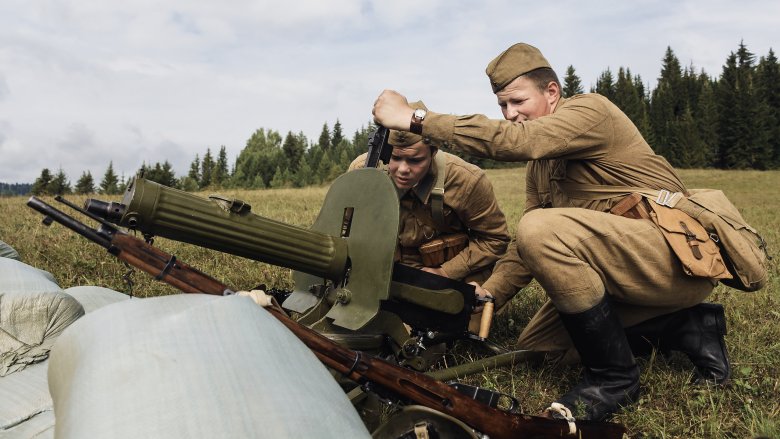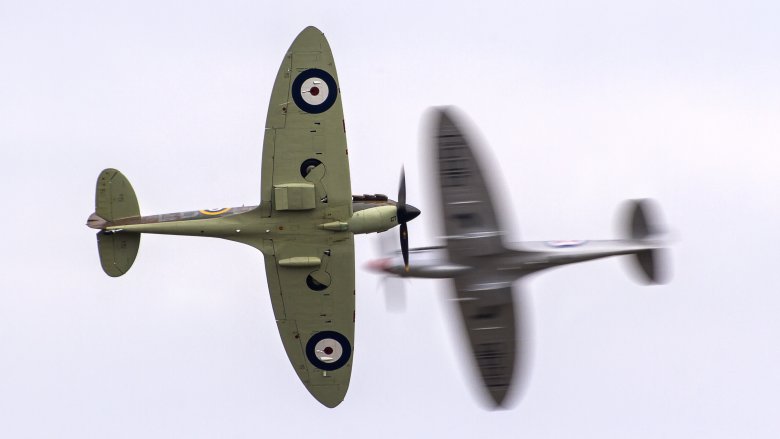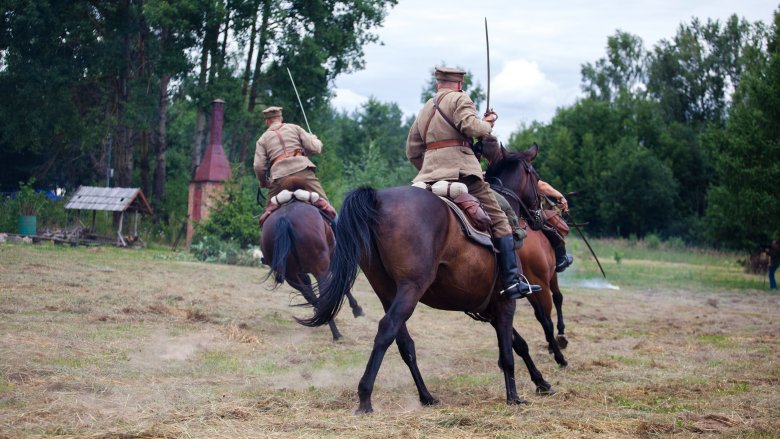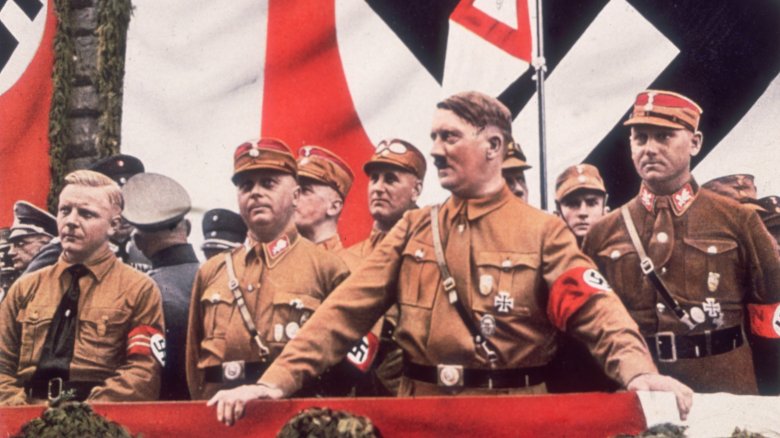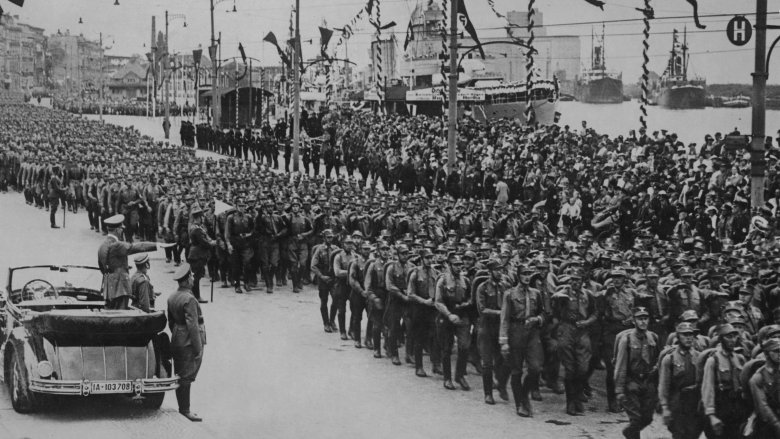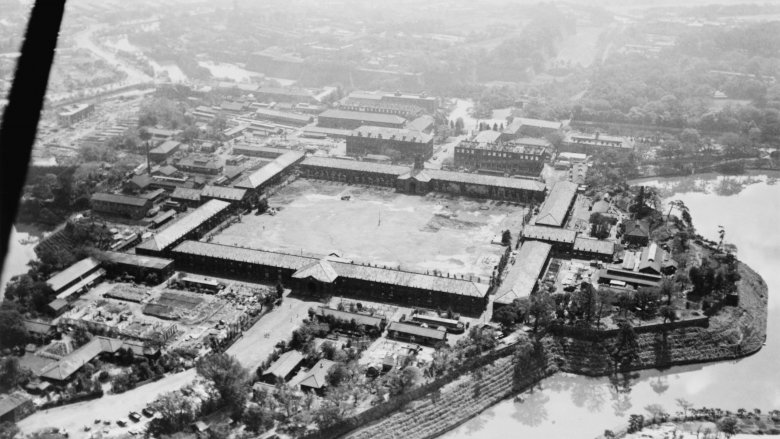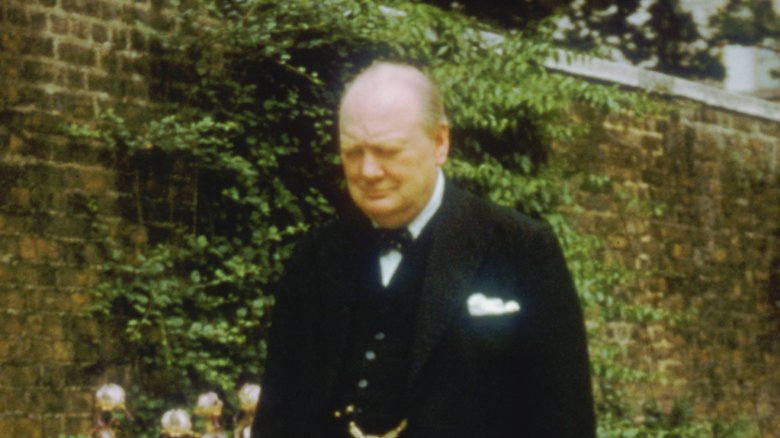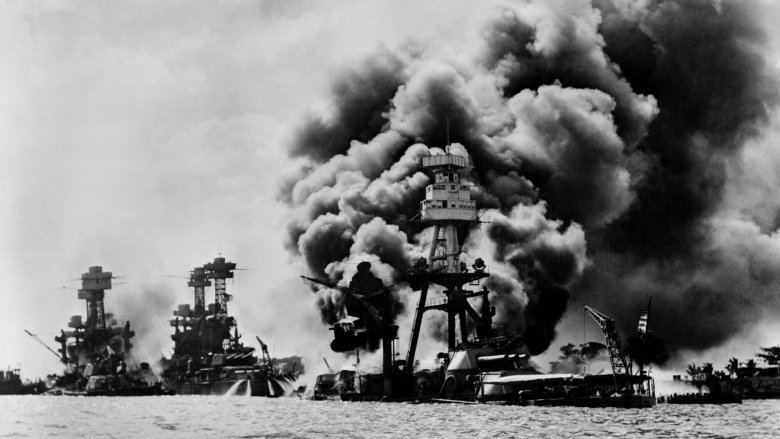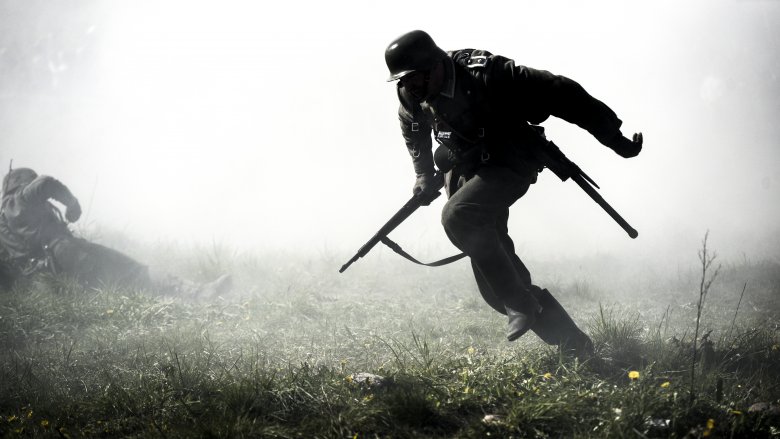False Facts About World War II You Always Believed
World War II may have started more than 75 years ago, but people still think about it a lot. You cannot go online without seeing someone be compared to Hitler or the Nazis. Hollywood cannot churn out movies about it fast enough, and there are thousands of books to read on the subject. Even people who don't normally consider themselves history experts are pretty sure they know the basics when it comes to World War II.
Except so much of what we think we know is wrong. Propaganda was flying around from all sides during the war, and even after all these years we still believe some of it. Hindsight has made some countries into cowards and some into heroes, while leaders from the time are either completely evil or pure perfection. Obviously, anything as messy as war is a lot more complicated than that. Here are some of the biggest myths you probably believe about World War II.
The French were cowardly surrender monkeys
The idea that the French military is useless comes from World War II when Hitler took over the country in just six weeks.
The Fall of France was, like most military actions, ridiculously complicated. There are a lot of reasons it happened, but none of them involve the French being wusses. The BBC describes them as putting up a "surprisingly stiff resistance" and that their fighting was "fierce" and "bold." But they were up against the German blitzkrieg ("lightning war"), a new and basically unbeatable fighting technique of blowing through your enemies. Then the Belgian army surrendered, leaving a hole in the Allied defenses, and Italy's Mussolini sensed the end and suddenly joined Germany as well. They had no chance.
Even as they knew all was probably lost, the French fought on so the British could evacuate at Dunkirk. According to the Weekly Standard, heavily outnumbered French troops held off the Germans, allowing an additional 100,000 British soldiers to escape.
The closest you could get to saying the French were scared was the concern of the leadership that everyone was going to die if they went on offense. This was fair enough since that is exactly what happened in World War I. So the plan was to stay on the defense for a few years. It didn't work.
After Paris fell to the Nazis, the French continued to show how not-frightened they were. Hundreds of thousands of people risked their lives to work with the Resistance, bravely fighting on without their government.
If it weren't for the USA, Europeans would be speaking German
It's normal for history books to compliment their readers. So it's understandable that the average American thinks their country defeated Hitler. Obviously, it involved the work of many nations, but if a single one gets the most credit, it has to be the Soviet Union.
According to war correspondent Eric Margolis, a ridiculous 75-80 percent of all Axis casualties during World War II were inflicted by the USSR. The Russians lost about 10 million soldiers, with another 15 million wounded and a further 17 million civilian deaths. The U.S. lost 400,000 troops during the war, about 139,000 of them in Europe.
Historians agree that Germany's defeat at Stalingrad was the turning point of the European war. And it was fighting the Soviets on the eastern front that broke the German military. It even destroyed the famed Luftwaffe. Because of this, by the time D-Day rolled around, Germany was bleeding out. The Allies would probably not have been able to succeed in Normandy if the Soviets hadn't already done so much. Then, after taking Berlin in 1945, the USSR turned around and crushed Japan's largest army in 11 days.
It was fully accepted at the time that Stalin saved everyone's butts. Both FDR and Churchill "lavished praise and thanks on the Soviet Union" for its "gigantic effort" in defeating Hitler. It was only with the onset of the Cold War that people stopped giving them credit.
Carrots made Allied fighter pilots see better in the dark
Carrots have a lot of Vitamin A and are in fact very good for your eye health. But during World War II, this morphed into the myth that eating carrots helped people see in the dark.
In this case, the myth started because of a fib promoted by the British government. According to Smithsonian Magazine, the Luftwaffe often struck British targets at night, but the British were able to take a lot of the German planes out thanks to a new, secret radar system. They didn't want the enemy to get suspicious, so they decided to just lie to everyone.
The Ministry of Information told British newspapers that their fighter pilots' success was down to eating lots and lots of carrots. This allegedly improved their night vision. They even gave their deadliest flying ace the nickname "Cat's Eyes" just to make it sound more believable.
There is, however, no real evidence the German leadership actually bought this, although there are some apocryphal stories that they started force-feeding their own pilots carrots. The people who fell for it completely were the British public. To make it harder for the Germans to bomb them, the English were made to live in total darkness at night for five years. They probably bumped into a lot of stuff. So when told something as simple as eating carrots could alleviate this problem, they embraced it.
The Polish stupidly used cavalry against German tanks
Before people realized that stereotypes are not cool, there were a lot of jokes about how stupid the Polish were. So the story that went around that during World War II they attacked German tanks using cavalry fit this narrative nicely. Those silly backward Poles, thinking horses could beat metal!
The myth started right after Hitler invaded Poland in 1939 and, according to Skeptoid, it is based in the tiniest bit of fact. The Poles did in fact attack the Germans using cavalry at the Charge of Krojanty, but there were no tanks involved and using horses wasn't even weird. It seems odd to us now, but every single army still used the animals in World War II. The Germans themselves utilized over 2 million horses and had six mounted divisions. So a cavalry charge, while not common, wasn't completely bonkers.
Then there's the fact they charged at infantry, not tanks. Being on a horse is a distinct advantage when you're attacking soldiers on foot, and the charge actually worked. The Poles killed 11 Germans, injured nine more, and the whole enemy regiment panicked and ran.
The problem was, the Germans eventually got themselves together and retaliated using armored cars and machine guns. They won, and many Poles died. Waiting war correspondents were taken onto the battlefield by the Germans, shown Polish bodies, and told they had charged tanks on horseback. The journalists shared the story with the world, and this Nazi propaganda became a supposed fact.
Hitler always wanted to exterminate the Jews
Look, no one is going to argue that Adolf Hitler didn't hate the Jews with a psychotic passion. He was pretty darn clear about that. But what is true is that he didn't always want to kill every last one of them. That wouldn't become Nazi policy until 1941 and the development of the Final Solution. Before that he just seems to have wanted Jews to go away and leave him alone.
According to History, as late as 1940 Hitler approved a bizarre plan to send all of Europe's remaining Jews to Madagascar. (He did not ask the Madagascans if they were okay with this.) This was meant to show the world how "generous" the Germans were, except the idea was really just to make a giant ghetto. Jews would not be allowed to bring any property with them and would be under the control of a watchful police force. They would also be hostages, their treatment dependent on "the future good behavior of the members of their race in America" for some crazy reason.
This plan was totally expected to happen. German officials let Jews know where they would be heading soon, and the Nazis even stopped building ghettos in Poland on the assumption they would no longer be needed. But the plan was abandoned when the Germans realized they didn't have enough ships to do the transporting and that Allied navies were in the way.
The Nazis were a well-oiled machine
People tend to think of Germans, and especially the Nazi party, as militaristic, regimented, and serious. The Nazis went from a tiny, ridiculed political party, to ruling over most of Europe in a shockingly short period of time. To do that, they must have been a perfectly well-oiled machine that ran like clockwork, right?
Not according to The Nazi Dictatorship: Problems and Perspectives of Interpretation. It turns out that quickly going from a small political party based on personal loyalty to Hitler to running a "sophisticated, modern government machine" is harder than it sounds. Historians agree that Nazi Germany's system of government was "chaotic in structure" and while all governments could probably be described that way to an extent, the Nazis were in confusion to a more "extreme degree" than average.
Nor was Hitler the all-powerful ruler he seemed like. He made some decisions that really undercut his authority. For example, he decided the position of Fuhrer always needed to be respected, so he tried to stay out of petty political squabbles or any decision that might be unpopular. The problem is, that stuff can be really important, and if you want to be a dictator you need to be involved in everything. He also allowed some people, like Goering and Himmler, to get huge amounts of their own power. And the New York Times says Hitler's generals were not frightened of him, routinely fighting with him over military strategy.
Hiroshima and Nagasaki were the deadliest bombings of the war
The deadliest bombing of a single city in history occurred in Japan during World War II, but it was not caused by one of the atomic bombs. While more people would die later from radiation poisoning and other complications, the initial death toll in Hiroshima was 60,000 to 80,000 people, while in Nagasaki it was about 75,000. But on March 9, 1945, the U.S. military killed 100,000 people in one night during the firebombing of Tokyo, an event barely talked about today.
They had waited for a clear, windy night, according to the Australian Broadcasting Corporation, in order to inflict the most damage. Then, 300 B-29 bombers got to work. They dropped 500,000 cylinders of napalm and petroleum jelly, picking the most densely populated areas of the city as their targets. Soon, more than 15 square miles of Tokyo were an inferno. On top of the 100,000 dead, another million were "maimed" and an additional million made homeless. Since able-bodied men were away fighting, most of the victims were women, children, and the elderly.
It was, as you can imagine, horrific. One woman, then 10 years old, watched her family burn to death, an experience "worse than hell." Another survivor thinks it was only done as "punishment," since there were no military factories in the area. Even the U.S. general who ordered it later said that, if the Allies had lost he would have been charged with war crimes.
Winston Churchill was universally loved and inspiring
In 2002, a national poll found people thought the greatest ever Briton was Winston Churchill. He beat out eminent individuals like William Shakespeare, Isaac Newton, and Princess Diana. His contemporaries might have found this a bit confusing, since he was far from the universally beloved and inspiring leader we think of him as today.
Take, for example, all those great speeches he's famous for. After the evacuation at Dunkirk and the fall of France, Churchill stood up in Parliament and said there was absolutely no reason for "panic or despair." He talked about everyone's "inflexible resolve" to keep fighting, and that the "terrible foe" was totally going to be vanquished. He summed it up in one of his most famous lines: Even if the British Empire lasted a thousand years, people would still say "this was their finest hour."
Stirring stuff. Except according to the International Business Times, a report the next day found that the average listener was less than impressed. A bunch of people thought he sounded drunk (which was entirely possible, since he drank a ridiculous amount every day). Others were nicer and said he just seemed tired or not very confident. Other speeches got similar reactions. People especially didn't like when he went on about the war being long and bloody.
The best evidence of how voters felt about him came in July 1945, when they unceremoniously threw him out of office. His party lost before Japan had even surrendered.
The bombing of Pearl Harbor was a shock because no one expected war with Japan
Pearl Harbor was supposedly a surprise attack that shocked everyone in America because nobody expected war with Japan. But in reality, the U.S. and Japan had been pissed at each other for a long time.
According to Global Security, America first came up with War Plan Orange in 1890. This doctrine assumed there would eventually be conflict with Japan. After the Spanish-American War in 1898, the U.S. suddenly found itself with a lot more territory in the Pacific and expected Japan would try and take it one day. A special joint Army-Navy Board updated War Plan Orange in 1904 and began planning to fight Japan in earnest as early as 1906. In the early 1920s the military developed the Pacific Strategic War Plan, and it was revised at least six times between 1924 and 1938.
Japan wasn't thrilled with the U.S. either. The island country was overpopulated, and the National Endowment for the Humanities says their government was mad the U.S. would not accept Japanese immigrants. Throughout the 1930s, Japan kept trying to take over bits of China. The American government refused to recognize any of their conquests, implemented some economic sanctions, and gave a little military assistance to China. History reports those half-measures were enough for Japan, who bombed and sank the American gunboat Panay in 1937.
The two countries' relationship was so contentious that a Gallup poll taken shortly before Pearl Harbor found 52 percent of Americans expected war with Japan while only 27 percent did not.
The war definitely started in 1939
The official start date of World War II is September 1, 1939, when Hitler invaded Poland. Two days later, Britain and France declared war on Germany. Conveniently, Britain and France would also end up on the winning side of the war, so they could decide when it began. But HistoryNet says many historians have made interesting arguments that this complicated, globe-spanning conflict actually started earlier.
First there's Japan's 1937 invasion of China. Japan was a big part of World War II, so why would this act of aggression not count? Or maybe you like Germany's 1936 occupation of the Rhineland better, something they were very specifically told not to do in the Treaty of Versailles, and the action that allowed them to become aggressive in Western Europe in the first place. If the other Axis power, Italy, needs to be involved, they attacked Ethiopia in 1935. And invasion-happy Japan had already taken over Manchuria in 1931.
There are even some people that argue World War II started right at the end of World War I, or at least once the Treaty of Versailles was signed, because it basically guaranteed the fighting would start up again. The most out-there claim might be that it started during World War I, with the beginning of the Russian Revolution in 1917.
But if a teacher asks, best to just stick with 1939.

